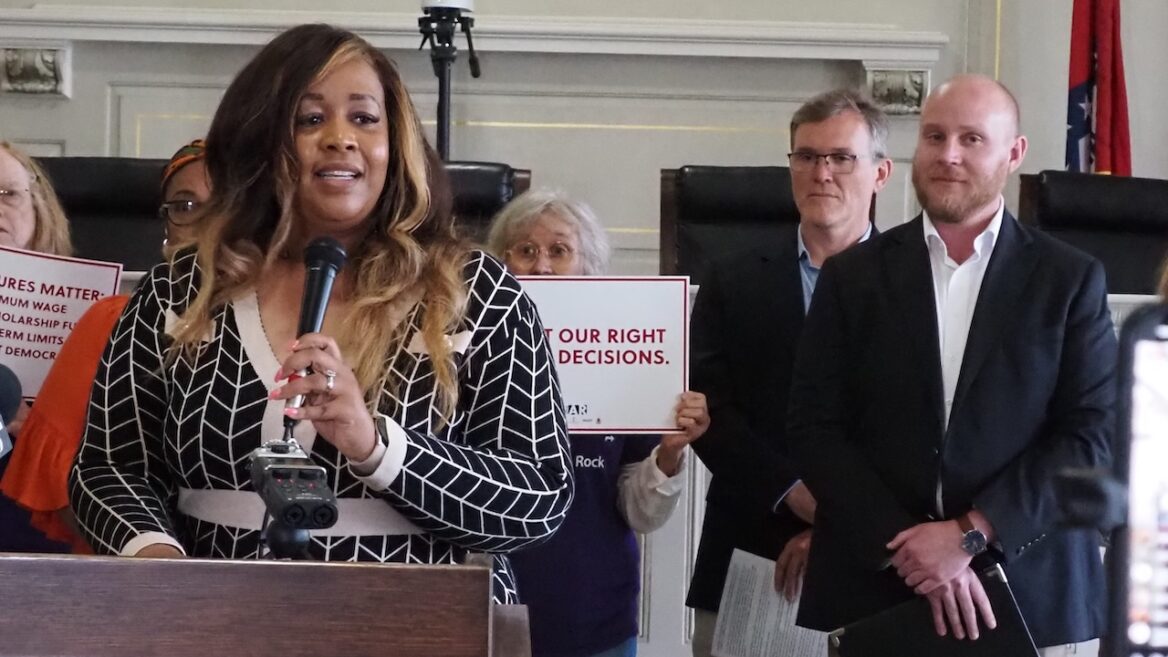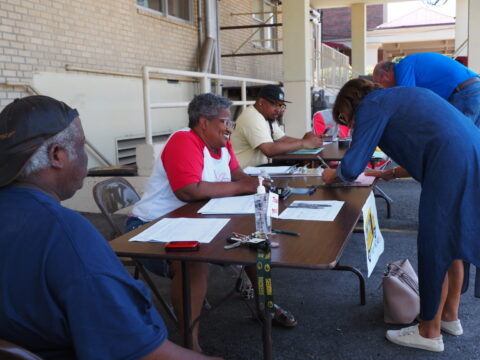by Antoinette Grajeda, Arkansas Advocate
June 2, 2025
Arkansas Attorney General Tim Griffin on Monday said he could not certify a proposed constitutional amendment related to direct democracy because it violates a new state law that prohibits ballot titles from being written above an eighth-grade reading level.
Act 602, which became law in April, prohibits the attorney general from certifying a proposed ballot title with a reading level above eighth grade as determined by the Flesch-Kincaid Grade Level formula. The test uses word complexity and sentence lengths to calculate what grade of education is needed to comprehend written material.
“The ballot title you have submitted ranks at grade 11.5. Thus, your ballot title requires significant revisions before it complies with the Act,” according to Monday’s opinion, which was prepared by Assistant Attorney General Jodie Keener and approved by Griffin.
Monday’s opinion identified additional issues with the proposal, including ambiguity regarding the Arkansas General Assembly’s authority and how conflicting measures become law.
The Arkansas Ballot Measure Rights Amendment, sponsored by the Protect AR Rights coalition, would amend Article 5 Section 1 of the Arkansas Constitution, the section that governs the state’s initiative and referendum process. It would designate as a “fundamental right” the right of voters to propose laws and constitutional amendments that can be put to a statewide vote.
Among its various provisions, the measure would require petition signatures be gathered from at least 15 counties instead of 50 and would explicitly prohibit the Arkansas General Assembly from amending or repealing a constitutional amendment approved by voters.
This is the second ballot measure proposed this year in response to state lawmakers approving about a dozen direct democracy-related laws during the 2025 legislative session. Supporters of the new laws have said they will ensure the integrity of the initiative and referendum process, while opponents have argued it will make it more difficult for citizen-led initiatives to qualify for the ballot.
The direct democracy process allows Arkansans to propose new laws or constitutional amendments and put them to a statewide vote. Arkansas is one of 24 states that allows citizen-led initiatives, according to the National Conference of State Legislatures.
Protect AR Rights spokesperson Bill Kopsky said in a phone interview that Monday’s decision was expected because the attorney general often rejects the first draft of a proposed ballot title. The ballot question committee intends to request a meeting with Griffin’s staff to gather feedback, Kopsky said.
In an emailed statement, Protect AR Rights noted this was “the first step in a long process, and our coalition remains fully committed to protecting the rights of Arkansans to shape their own laws.” Griffin’s rejection of the group’s proposed amendment reinforces why it’s “so urgently needed,” according to the group.
“We’re reviewing the AG’s feedback and will revise and resubmit our amendment. But let’s be clear: the new 8th grade reading requirement — passed by politicians trying to limit access to the ballot — is a serious barrier to a fundamental right,” the statement reads. “We believe measures should be clear, accessible, and accurate. That’s exactly why we’re fighting this provision in court.”
Protect AR Rights and For AR Kids, another ballot question committee pursuing an education-focused constitutional amendment, are trying to challenge Act 602 by intervening in a federal lawsuit that challenges several other new laws governing the state’s direct democracy process.
The League of Women Voters of Arkansas filed the lawsuit against the secretary of state in April. The League proposed its own direct democracy-related ballot measure this year that was thrice rejected by the attorney general, including once for violating Act 602. Griffin substituted and certified the popular name and ballot title so it met the eighth grade-reading level requirement on May 21. That means the League can begin gathering signatures to try to place their measure on the 2026 ballot.
In response to the motion to intervene, both the League and the state argued in court filings last week that Protect AR Rights lacks standing and is not entitled to intervene in the case.
Protect AR Rights could file its own lawsuit if a judge dismisses the motion to intervene, but Kopsky said the court would likely freeze both lawsuits while deciding whether to consolidate them.
“We believe it would slow the process down substantially, which doesn’t seem to be in anybody’s interest,” he said. “So we were surprised that they opposed the motion to intervene, but our legal team is going to respond to it in a way that’s appropriate. The bottom line is we’re committed to protecting the right to direct democracy and the right to have access to ballot measures in the state.”




